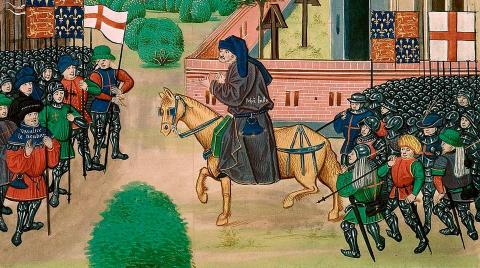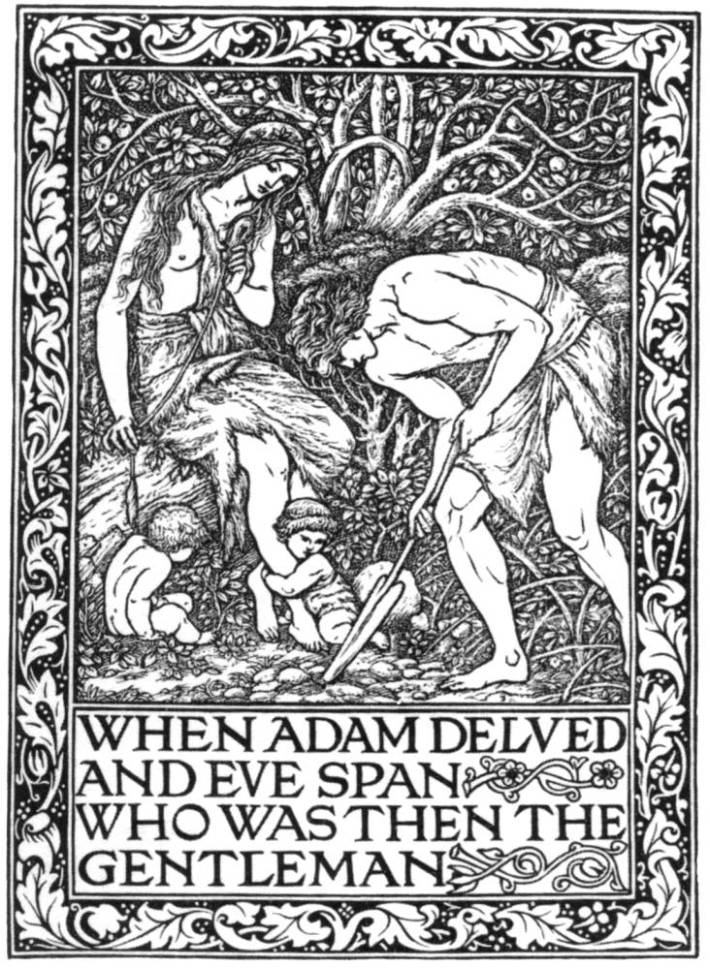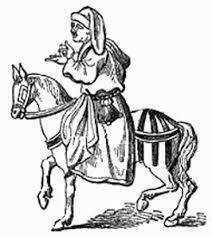
“When Adam delved and Eve span, Who was then the gentleman?”
John Ball (c. 1340-1381) was a wandering radical preacher, a “hedgerow priest”, who came to the fore in the medieval Peasants’ Revolt in England.
He was thrown out of his job as a priest in Colchester in 1366 and started travelling around medieval England, spreading the word of revolt. He was thrown in jail on several occasions.
In 1381, when 100,000 rebels marched into London, capturing towns and castles on their way, they freed him from prison.
Ball preached to the crowds at Blackheath and it is here that he asked the famous rhetorical question: “When Adam delved and Eve span, Who was then the gentleman?”
George Woodcock identifies Ball as one of the figures of the English and German peasant uprisings who first voiced “the kind of social criticism that was to end in anarchism”. (1)
 The fragment of his speech which was preserved for posterity by French chronicler Jean Froissart “attacks both property and authority and implies a link between them that anticipates the arguments developed by the nineteenth-century anarchists”, adds Woodcock. (2)
The fragment of his speech which was preserved for posterity by French chronicler Jean Froissart “attacks both property and authority and implies a link between them that anticipates the arguments developed by the nineteenth-century anarchists”, adds Woodcock. (2)
Ball said: “Things cannot go well in England, nor ever will, until all goods are held in common, and until there will be neither serfs not gentlemen, and we shall be equal.
“For what reason have they, whom we call lords, got the best of us? How did they deserve it? Why do they keep us in bondage? If we all descend from one father and one mother, Adam and Eve, how can they assert or prove that they are more masters than ourselves? Except perhaps that they make us work and produce for them to spend!” (3)
Ball told his medieval contemporaries that their serfdom was unjust and that the time had come when they could “cast off the yoke they have borne so long and win the freedom they have always yearned for”. (4)
Ball’s radicalism was very much inspired by the dream of a Golden Age, the idea of a natural, organic, egalitarian society which had been stolen from the people.
Talking about the weeds (“tares”) in the Bible that had almost choked the good grain, he declared that the tares were the great lords, the judges and the lawyers. They all had to go, so that the people could all enjoy equal freedom, rank, and power, and share all things in common. (5)
When the authorities had crushed the revolt, Ball was tried and executed in the presence of Richard II.

Ball has been an inspirational figure for countless generations of English radicals. He appears, for instance, as a character in an anonymous 1593 play called The Life and Death of Jack Straw and would have been familiar to Gerrard Winstanley and the other radicals of the 17th century English Revolution who took up his call for an England where all things were held in common.
In 1888 William Morris published his novel A Dream of John Ball, in which a time-traveller updates Ball on the end of feudalism and subsequent rise of industrial capitalism. The radical priest realises that his hopes for a free and egalitarian future have yet to be realised, five hundred years after his death.
In 1999, an article in Green Anarchist declared that Ball’s message was “not of moderation, not of putting limited demands for financial improvement, but of the revolutionary desire for authenticity and true human community that underlay them, of the courage to fight for ourselves and our visions”. (6)
Video link: The Thoughts of John Ball (5 mins)

1. George Woodcock, Anarchism: A History of Libertarian Ideas and Movements (Harmondsworth: Penguin, 1979), p. 38.
2. Ibid.
3. Woodcock, p. 39.
4. Peter Marshall, Demanding the Impossible: A History of Anarchism (London: Fontana, 1993), p. 91.
5. Ibid.
6. John Connor, ‘John Ball – Primitivist: The Peasants’ Revolt and the State of Nature’, Green Anarchist #57-58, Autumn 1999. theanarchistlibrary.org
